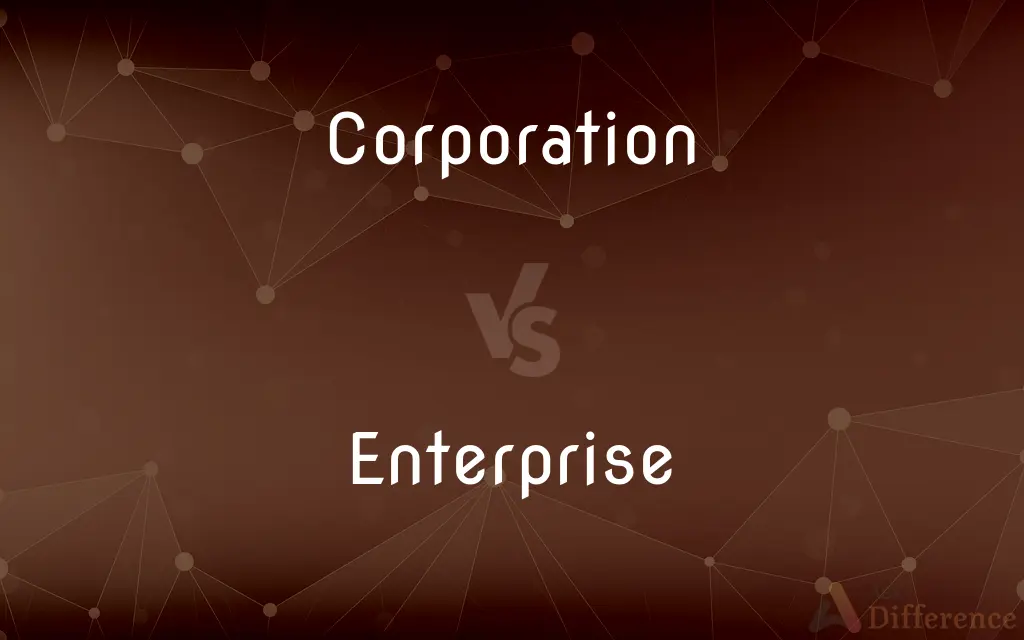Corporation vs. Enterprise — What's the Difference?
By Maham Liaqat & Fiza Rafique — Updated on March 11, 2024
Corporation and enterprise are both organizational entities but differ mainly in their legal structure and scope.

Difference Between Corporation and Enterprise
Table of Contents
ADVERTISEMENT
Key Differences
Corporation typically refers to a legal entity that is distinct from its owners, with its own rights, liabilities, and obligations, while an enterprise can be any business activity, project, or venture, regardless of its legal structure.
A corporation is often established through a legal process and is recognized as a separate entity by law, capable of owning assets, incurring liabilities, and entering into contracts. It offers limited liability to its shareholders, meaning their personal assets are protected from the corporation's debts and liabilities. On the other hand, an enterprise can refer to a whole company or organization, regardless of its legal structure, and encompasses all of its undertakings and projects.
Corporations are also subject to corporate taxes and are required to follow specific regulatory compliances, including public reporting if they are publicly traded. The term "enterprise" is broader and can include sole proprietorships, partnerships, corporations, and more. It represents the initiative and risk involved in running a business and can vary in size from small personal businesses to large multinational corporations.
While corporations are a specific type of legal entity with defined characteristics and structures, enterprises encompass a wider range of business activities and can be structured in various ways, including as corporations. The choice between operating as a corporation or another form of enterprise depends on factors such as the size of the business, the level of risk the owners are willing to take on, and the regulatory requirements of the industry in which the business operates.
All corporations can be considered enterprises in the sense that they undertake business activities, but not all enterprises are corporations. The key distinction lies in the legal structure and the scope of the term "enterprise," which is broader and more inclusive.
ADVERTISEMENT
Comparison Chart
Legal status
Legally distinct entity from its owners
Can be any form of business, not necessarily a separate legal entity
Ownership
Shares owned by shareholders
Can be owned by an individual, partners, or shareholders
Liability
Limited liability for shareholders
Depends on the business structure; can range from limited to unlimited
Taxation
Subject to corporate taxes
Taxation varies based on the legal structure
Regulatory compliance
Often subject to stringent regulations and public reporting
Regulatory requirements vary widely depending on the form
Compare with Definitions
Corporation
A legal entity that is separate and distinct from its owners, with rights to own assets, incur liabilities, and enter into contracts.
The corporation was registered in Delaware, a popular state for corporate registration due to its favorable laws.
Enterprise
Any business activity, project, or venture, regardless of its legal structure.
His new enterprise involved importing exotic fruits to local markets.
Corporation
An organization with limited liability for its shareholders, meaning they are not personally liable for the company's debts.
Investors preferred the corporation for its limited liability protection.
Enterprise
Encompasses the initiative and risk involved in running a business.
Starting her own enterprise was a challenging yet rewarding journey.
Corporation
A business entity that is subject to corporate taxation separate from its owners.
As a corporation, the business had to file its own tax returns and pay corporate income tax.
Enterprise
Can refer to the entire business organization or company.
The enterprise has grown significantly, with over 500 employees now.
Corporation
Often, a corporation is required to adhere to strict regulatory compliances, including periodic public reporting.
The corporation filed its annual report with the SEC, as required by law.
Enterprise
An enterprise can be a sole proprietorship, partnership, corporation, or any other form of business.
Their family enterprise started as a small shop and expanded into a chain of stores.
Corporation
Corporations can raise capital by issuing shares of stock to the public or private investors.
The corporation decided to go public and issued shares to raise capital for expansion.
Enterprise
The term is often used in the context of entrepreneurial ventures and innovative projects.
The tech enterprise became known for its innovative solutions in software development.
Corporation
A corporation is an organization—usually a group of people or a company—authorized by the state to act as a single entity (a legal entity recognized by private and public law "born out of statute"; a legal person in legal context) and recognized as such in law for certain purposes. Early incorporated entities were established by charter (i.e.
Enterprise
A project or undertaking, especially a bold or complex one
A joint enterprise between French and Japanese companies
Corporation
An entity such as a business, municipality, or organization, that involves more than one person but that has met the legal requirements to operate as a single person, so that it may enter into contracts and engage in transactions under its own identity.
Enterprise
A business or company
A state-owned enterprise
Corporation
Such a body created for purposes of government. Also called body corporate.
Enterprise
An undertaking, especially one of some scope, complication, and risk.
Corporation
A group of people combined into or acting as one body.
Enterprise
A business organization.
Corporation
(Informal) A protruding abdominal region; a potbelly.
Enterprise
Industrious, systematic activity, especially when directed toward profit
Private enterprise is basic to capitalism.
Corporation
A body corporate, created by law or under authority of law, having a continuous existence independent of the existences of its members, and powers and liabilities distinct from those of its members.
Enterprise
Willingness to undertake new ventures; initiative
"Through want of enterprise and faith men are where they are, buying and selling, and spending their lives like serfs" (Henry David Thoreau).
Corporation
The municipal governing body of a borough or city.
Enterprise
A company, business, organization, or other purposeful endeavor.
The government sponsored enterprises (GSEs) are a group of financial services corporations which have been created by the United States Congress.
A micro-enterprise is defined as a company or business having 5 or fewer employees and a low seed capital.
Corporation
(historical) In Fascist Italy, a joint association of employers' and workers' representatives.
Enterprise
An undertaking, venture, or project, especially a daring and courageous one.
Biosphere 2 was a scientific enterprise aimed at the exploration of the complex web of interactions within life systems.
Corporation
A protruding belly (perhaps a play on the word corpulence).
Enterprise
(uncountable) A willingness to undertake new or risky projects; energy and initiative.
He has shown great enterprise throughout his early career.
Corporation
A body politic or corporate, formed and authorized by law to act as a single person, and endowed by law with the capacity of succession; a society having the capacity of transacting business as an individual.
Enterprise
(uncountable) Active participation in projects. en
Corporation
A business firm whose articles of incorporation have been approved in some state
Enterprise
(intransitive) To undertake an enterprise, or something hazardous or difficult.
Corporation
Slang terms for a paunch
Enterprise
(transitive) To undertake; to begin and attempt to perform; to venture upon.
Enterprise
(transitive) To treat with hospitality; to entertain.
Enterprise
That which is undertaken; something attempted to be performed; a work projected which involves activity, courage, energy, and the like; a bold, arduous, or hazardous attempt; an undertaking; as, a manly enterprise; a warlike enterprise.
Their hands can not perform their enterprise.
Enterprise
Willingness or eagerness to engage in labor which requires boldness, promptness, energy, and like qualities; as, a man of great enterprise.
Enterprise
To undertake; to begin and attempt to perform; to venture upon.
The business must be enterprised this night.
What would I not renounce or enterprise for you!
Enterprise
To treat with hospitality; to entertain.
Him at the threshold met, and well did enterprise.
Enterprise
To undertake an enterprise, or something hazardous or difficult.
Enterprise
A purposeful or industrious undertaking (especially one that requires effort or boldness);
He had doubts about the whole enterprise
Enterprise
An organization created for business ventures;
A growing enterprise must have a bold leader
Enterprise
Readiness to embark on bold new ventures
Common Curiosities
What is an enterprise?
An enterprise can refer to any business activity, venture, or the entire business organization, regardless of its legal structure.
How does liability differ between a corporation and an enterprise?
In a corporation, shareholders have limited liability, protecting their personal assets. In an enterprise, liability depends on the business structure, ranging from limited to unlimited.
Can an enterprise be a corporation?
Yes, an enterprise can be a corporation if it is structured and registered as such, but it can also take other forms.
Is the term 'enterprise' more flexible than 'corporation'?
Yes, "enterprise" is a broader term that encompasses various forms of business activities and structures, including corporations.
What is a corporation?
A corporation is a legal entity that is separate from its owners, with its own rights, liabilities, and obligations.
Do all corporations have to publicly report their finances?
Publicly traded corporations are required to report their finances publicly, but private corporations may not have the same requirement.
Are enterprises subject to corporate taxes?
Enterprises structured as corporations are subject to corporate taxes, while other forms may be taxed differently based on their legal structure.
Do corporations always issue shares?
Most corporations issue shares to represent ownership, but the specifics can vary, especially in closely held private corporations.
Are corporations always larger than other forms of enterprises?
Not necessarily. While corporations are often larger due to their ability to raise capital and scale, there are also small corporations and large enterprises that are not corporations.
Is it easier to transfer ownership in a corporation or an enterprise?
Ownership transfer is typically easier in a corporation through the sale of shares, compared to some forms of enterprises that may require more complex arrangements.
Can a single person own a corporation?
Yes, a single person can own all the shares of a corporation, making them the sole shareholder.
What is the main advantage of forming a corporation?
The main advantage is the limited liability protection it offers to its shareholders.
Can an enterprise involve multiple business projects?
Yes, an enterprise can encompass multiple business activities or projects under one organization.
Can an enterprise be non-profit?
Yes, enterprises can be non-profit, focusing on social, educational, or charitable activities rather than profit-making.
What are the key factors in deciding to form a corporation versus another type of enterprise?
Key factors include the desired level of liability protection, tax considerations, regulatory requirements, and the need to raise capital.
Share Your Discovery

Previous Comparison
Choice vs. Decision
Next Comparison
Chinese vs. KoreanAuthor Spotlight
Written by
Maham LiaqatCo-written by
Fiza RafiqueFiza Rafique is a skilled content writer at AskDifference.com, where she meticulously refines and enhances written pieces. Drawing from her vast editorial expertise, Fiza ensures clarity, accuracy, and precision in every article. Passionate about language, she continually seeks to elevate the quality of content for readers worldwide.
















































